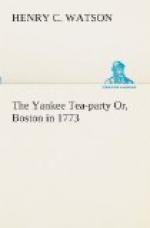“‘Wife,’ said he, ’is there not an old gun-barrel somewhere in the garret.’
“‘I believe there was,’ said she; ‘but pray what do you want with it?’
“‘I should like to see if it is fit for service,’ replied he. ’If I am not mistaken, it is good enough to drill a hole through a rig’lar.’
“’Mercy on me, husband! are you going mad? An old man like you—sixty years last November—to talk of going to war! I should think you had seen enough of fighting the British already. There lies poor Captain Roe and his men bleeding on the grass before your eyes. What could you do with a gun?’
“The old man made no reply, but ascended the stairs, and soon returned with a rusty barrel in his hands. In spite of his wife’s incessant din, he went to his shop, made a stock for it, and put it in complete order for use. He then saddled a strong white horse, and mounted him. He gave the steed the rein, and directed his course toward Concord. He met the British troops returning, and was not long in perceiving that there was a wasp’s nest about their ears. He dashed so closely upon the flank of the enemy that his horse’s neck was drenched with the spouting blood of the wounded soldiers. Then reining back his snorting steed to reload, he dealt a second death upon the ranks with his never-failing bullet. The tall, gaunt form of the assailant, his grey locks floating on the breeze, and the color of his steed, soon distinguished him from the other Americans, and the regulars gave him the name of ’Death on the pale horse.’ A dozen bullets whizzed by his head, when he made the first assault, but, undismayed, the old patriot continued to prance his gay steed over the heads of the foot-soldiers—to do his own business faithfully, in the belief that, because others did wrong by firing at him, it would be no excuse for him to do wrong by sparing the hireling bullies of a tyrannical government. At length, a vigorous charge of the bayonet drove the old man, and the party with which he was acting, far from the main body of the British. Hezekiah was also out of ammunition, and was compelled to pick up some on the road, before he could return to the charge. He then came on again and picked off an officer, by sending a slug through his royal brains, before he was again driven off. But ever and anon, through the smoke that curled about the flanks of the detachment, could be seen the white horse of the veteran for a moment—the report of his piece was heard, and the sacred person of one of his majesty’s faithful subjects was sure to measure his length on rebel ground. Thus did Hezekiah and his neighbors continue to harass the retreating foe, until the Earl Percy appeared with a thousand fresh troops from Boston. The two detachments of the British were now two thousand strong, and they kept off the Americans with their artillery while they took a hasty meal. No sooner had they again commenced their march, than the powerful white horse was seen careering at full speed over the hills, with the dauntless old yankee on his back.




